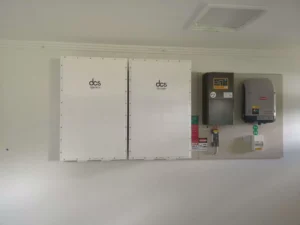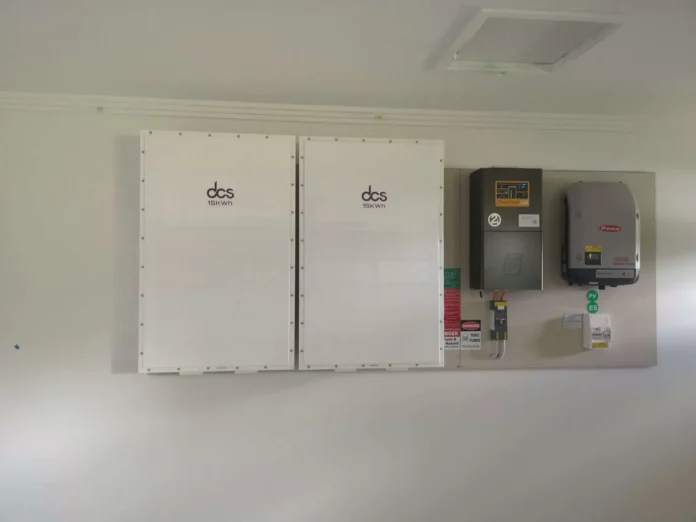In today’s world, more and more people are turning to off-grid living to reduce their carbon footprint and become self-sufficient. One of the critical components of off-grid living is a reliable energy source, and lithium-ion solar batteries have become increasingly popular for powering off-grid homes. This blog post will explore the benefits of using lithium ion solar batteries, how to choose the right one for your solar system and tips for maximising efficiency.
Understanding Lithium-Ion Solar Batteries
Lithium-ion solar batteries represent a significant advancement in energy storage technology, tailored explicitly for solar energy systems. These batteries leverage lithium ions’ unique properties to offer a superior energy storage solution. They have a remarkable efficiency rate, meaning a more significant portion of the solar energy captured is stored and available, compared to traditional battery technologies.
Their lightweight nature also contributes to their appeal, especially in scenarios where space and weight are at a premium. Furthermore, they exhibit an enhanced cycle life, enduring thousands of charge and discharge cycles before any noticeable degradation occurs. This resilience makes them particularly suited to the demands of off-grid solar applications, where reliability and longevity are paramount.
Lithium-ion batteries’ operational characteristics, such as their low self-discharge rate, ensure that the stored solar energy remains available over extended periods, enhancing their practicality for off-grid living. These attributes collectively underscore the transformative potential of lithium-ion solar batteries in harnessing and utilising solar power more effectively, heralding a new era of efficiency and sustainability in off-grid energy systems.
The Advantages of Going Off-Grid with Lithium-Ion Batteries
Embracing off-grid living with lithium-ion batteries offers a multitude of benefits. Their higher energy density is particularly advantageous, enabling a significant amount of energy to be stored in a comparably small space – an essential feature for off-grid homes where space efficiency is critical. Moreover, these batteries boast a considerably longer lifespan and can endure more charge cycles than their lead-acid counterparts, ensuring they are a more economical choice.
Another notable advantage is their quick charging capability, which allows for faster energy replenishment, thus making them highly efficient in off-grid setups. Lithium-ion batteries demonstrate a lower power loss rate when idle, meaning the energy stored is retained mainly until needed. This characteristic is invaluable for off-grid living, providing a reliable and constant power supply. Their robustness and low maintenance requirements further reduce the hassle and potential additional costs, making the transition to off-grid living smoother and more sustainable.
Features Of Off Grid Solar Batteries
Key characteristics that distinguish off-grid solar batteries are designed to optimise energy storage and ensure consistent power supply in remote settings. Amongst these, including advanced battery management systems (BMS) is crucial. These systems diligently monitor the battery’s state, balancing the cells and safeguarding against potential risks such as overcharging and overheating, which are critical for maintaining battery health and safety.
Linking multiple batteries to scale up the storage capacity offers flexibility in meeting diverse energy demands. This scalability is essential in off-grid installations, allowing for customised energy storage solutions that can adapt to varying power needs over time.
Compatibility with solar power systems is another vital feature, ensuring that batteries seamlessly integrate with existing solar arrays and charge controllers for efficient energy conversion and storage. Some off grid solar batteries have intelligent technology, enabling remote monitoring and management. This feature allows users to track their system’s performance and adjust as necessary from afar, enhancing the user experience and maximising energy efficiency.
Choosing the Right Lithium-Ion Battery for Your Solar System
Selecting an appropriate lithium-ion battery for your off-grid solar system requires careful consideration of several critical factors beyond merely capacity and voltage. Your household’s energy needs will significantly dictate the specifications of the battery you choose. Begin by accurately calculating your daily energy consumption and considering any potential future increases.
This foresight ensures the battery you opt for can handle your current and upcoming energy demands without necessitating an early replacement. Another aspect to ponder is the battery’s depth of discharge (DoD). A higher DoD means you can utilise more of the battery’s capacity without adversely affecting its lifespan. Therefore, a battery with a high DoD could prove more cost-effective over time despite higher initial costs.
Compatibility with your existing solar power setup is paramount. Ensure that the lithium-ion battery integrates seamlessly with your solar panels and inverter. This might require checking the compatibility specifications or consulting with a professional installer. It’s wise to evaluate the battery manufacturer’s warranty and support services. A robust warranty and accessible technical support can safeguard your investment and provide peace of mind.
Installation Tips for Lithium-Ion Solar Batteries
When installing lithium-ion solar batteries, meticulous adherence to the manufacturer’s installation manual must be balanced. This guidance includes crucial aspects such as the correct wiring configuration and the batteries’ strategic positioning to ensure optimal functionality and safety. It’s imperative to allocate the batteries in a ventilated location and shield them from direct sunlight to mitigate the risks of overheating. Ensuring that the batteries are mounted securely will prevent potential movement that could lead to damage.
Regular inspection for any signs of physical damage or wear and constant performance monitoring is advised to identify and rectify any issues promptly. Engaging with a professional installer for the initial setup is also advisable to avoid common pitfalls that may not be obvious to the untrained eye. This approach guarantees that the installation meets the technical requirements and adheres to local regulations and standards, ensuring a seamless and efficient integration into your off-grid solar system.
Maintaining Your Lithium-Ion Battery to Ensure Longevity
Adopting a regular maintenance regimen is essential to maintaining the performance and extending the lifespan of your lithium-ion solar batteries. By focusing on preventative measures and routine checks, you can safeguard against common issues compromising battery health.
Regularly monitor battery charge levels
Ensure that your lithium-ion solar batteries are not left in a deeply discharged state for extended periods. Maintaining an optimal charge level, typically between 40% and 80%, is crucial to prevent strain and prolong battery life.
Keep the battery and its environment clean
Dust, dirt, and other contaminants can lead to overheating and reduced efficiency. Regular cleaning of the battery’s exterior and housing helps maintain optimal operating conditions.
Inspect and tighten connections
Loose connections can lead to inefficient charging or even potential safety hazards. Periodically check and tighten the battery terminals and connections to ensure efficient energy transfer and prevent power loss.
Temperature regulation
While lithium-ion batteries generally operate well across a broad range of temperatures, extreme cold or heat can impact their performance and longevity. If possible, install the battery in a location that remains within recommended temperature ranges, using insulation or cooling as necessary to mitigate extreme temperatures.
Maximising Battery Efficiency for Off-Grid Solar Systems
Employing a solar charge controller is indispensable for enhancing the efficiency of lithium-ion batteries within off-grid solar systems. This device adeptly manages the energy transfer from solar panels to the battery, preventing the risks associated with overcharging and facilitating charging at an ideal voltage. Equally critical is the accurate sizing of your solar system.
By ensuring your setup is adequately dimensioned to cater to your energy requirements, you can achieve an optimal charging process and prevent the battery from being overworked. Furthermore, adopting energy-efficient appliances and LED lighting can substantially reduce the overall energy consumption of your off-grid home, thereby lessening the burden on your lithium-ion batteries. This approach extends the battery’s life and contributes to a more sustainable living environment.
Implementing a usage schedule that aligns high-energy-consuming tasks with peak sunlight hours can also significantly contribute to battery efficiency. Maximising solar energy use when it’s most abundant minimises reliance on stored battery power, preserving its charge for when it’s genuinely needed. Monitoring your system’s energy output and consumption patterns is vital. This vigilance allows for timely adjustments to your energy usage or system configuration, ensuring that your lithium-ion battery operates within its most efficient parameters.
Optimizing Off Grid Batteries for Solar Power
Optimizing off grid batteries for solar power is crucial for maximizing the efficiency and reliability of a solar energy system. Off-grid batteries are essential for storing energy generated by solar panels, ensuring a continuous power supply when sunlight is unavailable. Choosing the right type of battery is fundamental to optimizing these batteries. Lithium-ion batteries are highly recommended due to their high energy density, long lifespan, and low maintenance needs.
These characteristics make lithium-ion batteries particularly effective for off-grid solar applications. Another critical factor is the proper sizing of off-grid solar batteries. The battery capacity should match the household or facility’s energy consumption patterns. Conducting an energy audit can help determine the appropriate battery size, ensuring that the system can store enough energy to meet demands during periods of low solar generation.
Maintaining optimal temperature conditions is also vital for the longevity and performance of off-grid solar batteries. Extreme temperatures can reduce battery efficiency and lifespan. Therefore, installing batteries in a temperature-controlled environment or using thermal management systems can significantly enhance their performance. Regular monitoring and maintenance of the battery system are essential. A battery management system (BMS) can help track battery health, prevent overcharging or deep discharging, and provide alerts for necessary maintenance.
Conclusion
Opting for an off-grid life with lithium-ion solar batteries promises efficiency, sustainability, and self-sufficiency. These batteries, crucial for resilient systems, offer long-lasting performance and flexibility for diverse energy needs. By understanding your energy usage and maintaining your system, you can maximise the potential of your off-grid setup. This approach supports the global movement towards renewable energy and positions off-grid living as an achievable goal, enhancing energy independence for many.
FAQs
How do lithium-ion solar batteries work?
Lithium-ion solar batteries store the electricity generated by solar panels during the day. This stored energy can then be used when the solar panels are not producing electricity, such as at night or during cloudy weather. The batteries use lithium ions moving between the anode and cathode to store and release energy.
What are the advantages of lithium-ion solar batteries over other types of batteries?
Lithium-ion solar batteries offer several advantages over other types of batteries, such as lead-acid batteries. They have a higher energy density, meaning they can store more energy in a smaller space. They also have a longer lifespan, with many models lasting over ten years.
Are lithium ion solar batteries safe?
Yes, lithium ion solar batteries are generally safe when used correctly. They are designed with multiple safety features, such as thermal management systems and protective circuits, to prevent overcharging and overheating. However, to mitigate any potential risks, it is important to follow manufacturer guidelines and ensure proper installation and maintenance.
How long do lithium-ion solar batteries last?
The lifespan of lithium-ion solar batteries can vary, but they typically last between 10 to 15 years, depending on usage and environmental conditions. They can handle thousands of charge and discharge cycles, making them a durable and long-lasting option for solar energy storage.
What factors should be considered when choosing lithium-ion solar batteries?
When choosing lithium-ion solar batteries, consider factors such as capacity, efficiency, lifespan, and cost. Additionally, compatibility with your solar panel system and the specific energy needs of your household or business should be considered to ensure optimal performance and value.
| Other Good Articles to Read |
| Skank Blogs |
| Unreal Blogs |
| Tba Blogs |
| All City Forums |
| Dany Blogs |
| Refuge Blogs |
| The Music Blogs |
| Key Forums |
| The Big Blog Theory |
| Joe Blogs |
| Blogs 4 Me |
| Blogs Emon |
| Related Business Listings |
| Contact Directory |
| Local Business Profiles |

